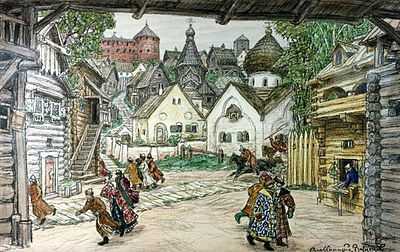The Oprichnik
From Wikipedia, the free encyclopedia
| Operas by Pyotr Ilyich Tchaikovsky |
|---|
 |
|
Tchaikovsky worked on the opera from February 1870 - March 1872. It includes music from his early opera The Voyevoda (1869). The work is dedicated to the Grand Duke Konstantin Nikolayevich Romanov. It was given its premiere performance at the Mariinsky Theatre in St Petersburg on 24 April 1874, followed by the Moscow premiere on 16 May 1874 at the Bolshoi Theatre.
Roles
| Role | Voice type | Premiere cast, St. Petersburg 24 April (12 April O.S.) 1874 (Conductor: Eduard Nápravník) |
Premiere cast, Moscow 16 May (4 May O.S.) 1874 (Conductor: Eduard Merten[1]) |
|---|---|---|---|
| Prince Zhemchuzhnïy | bass | Vladimir Vasilyev | Demidov |
| Natalya, his daughter | soprano | Wilhelmina Raab | Smelskaya |
| Molchan Mitkov, the bridegroom of Natalya | bass | V. F. Sobolev | |
| Boyarïnya Morozova, the widow | mezzo-soprano | Aleksandra Krutikova | Kadmina |
| Andrey Morozov, her son | tenor | D. A. Orlov | Aleksandr Dodonov |
| Basmanov, a young oprichnik | contralto | V. M. Vasilyev | Aristova |
| Prince Vyazminsky | baritone | Ivan Melnikov | Radonezhsky |
| Zakharyevna | soprano | Olga Shreder (Schröder) | |
| Chorus, silent roles: People | |||
Instrumentation
Source: www.tchaikovsky-research.net
- Strings: Violins I, Violins II, Violas, Cellos, and Double Basses
- Woodwinds: Piccolo, 2 Flutes, 2 Oboes, 2 Clarinets (1 in B-flat, 1 in A), 2 bassoons
- Brass: 4 Horns ( in F), 2 Trumpets (in D, F, and C), 3 Trombones, Tuba
- Percussion: Timpani, Triangle, Cymbals, Bass Drum
- Other: Harp
Synopsis

Apollinary Vasnetsov (1856-1933) The street in the town: the set to the opera The Oprichnik by Pyotr Tchaikovsky, 1911, paper, water-colour, coil, 52 x 83,2 cm. A.A. Bakhrushin Theatrical Museum, Moscow
- Introduction.
Act 1
- No. 1 — Scena
- No. 2 — Chorus of Maidens
- No. 2a – Natalya's Song
- No. 3 — Scena & Chorus
- No. 4 — Scena & Chorus
- No. 5 — Recitatives
- No. 5a – Basmanov's Arioso
- No. 6 — Natalya's Arioso
- No. 6a – Chorus of Maidens
Act 2
Entr'acte
- No. 7 — Scena & Morozova's Aria
- No. 8 — Scena & Duet
- No. 9 — Prelude, Scena & Finale
- No. 9a – Prince Vyazminsky's Aria
- No. 9b – Andrey's Aria
Act 3
Entr'acte
- No. 10 - Chorus of People
- No. 11 - Recitatives, Chorus of Boys & Duet
- No. 12 - Scena
- No. 12a-Natalya's Arioso
- No. 13 - Finale
Act 4
- No. 14 - Wedding Chorus
- No. 15 - Dances of Oprichniks & Women
- No. 16 - Recitatives, Chorus & Duet
- No. 17 - Chorus & Scena
- No. 18 - Scena & Quartet
- No. 19 - Closing Scena
Note: The entr'acte to Act II was written and scored by Vladimir Shilovsky.
Derived works
Arrangements by the composer
- Numbers from the opera for voices with piano accompaniment (1873)
- Funeral March on Themes from the Opera The Oprichnik (1877, lost)
Recordings
- 1980, Vladimirov, Milichkina, Nikitina, Matorin, Kuznetsov, Kotov, Klyonov. Gennady Provatorov (conductor), Chorus and Orchestra of the Central Television and Radio of the USSR.
- 2003, Vassily Savenko (Prince Zhemchuzhny), Elena Lassoskaya (Natalia), Dmitri Ulyanov (Molchan Mitkov), Irina Dolyenko (Boyarina Morozova), Vsevolod Grivnov (Andrei Morozov), Alexandra Dursseneva (Basmanov), Vladimir Ognovienko (Prince Vyazminsky), Cinzia de Mola (Zakharyevna) Orchestra e Coro del Teatro Lirico di Cagliari, Gennady Rozhdestvensky. Dynamic, reissued Brilliant.
References
- ↑ Eduard Merten became 2nd conductor at the Bolshoi Theatre shortly before 1870. He was "a talented pianist and composed romances, but was completely inexperienced as a conductor" (Kashkin, Erinerrungen, 64, 66) Edward H. Tarr, East Meats West; The Russian Trumpet Tradition from the Time of Peter the Great
External links
- Опричник: Free scores at the International Music Score Library Project
- Tchaikovsky Research
| ||||||||||||||||||||||||||||||||
This article is issued from Wikipedia. The text is available under the Creative Commons Attribution/Share Alike; additional terms may apply for the media files.